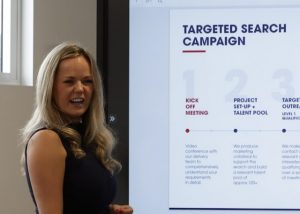The time it takes for newly hired sales professionals to start performing can have a significant impact on any size business, particularly for companies with less than 200 employees. Considering the effects of COVID-19 it is more critical than ever.
When a sales professional starts strong and achieves success within the required timeframe, the benefits to the organisation and individual are clear. Alternatively, if they start slow, it can be an incredibly stressful scenario for everyone involved.
Succeed quickly or fail slowly. Having recruited 1000’s of sales professionals at all levels, what stands out is success is largely determined by how strong they come out of the blocks. A strong start tends to have a huge impact on their long term success.
The companies that are getting it right are supporting their sales professionals by doing a few basic things that make all the difference, resulting in their sales people achieving success quickly. The following five points are based on what we are currently seeing work for B2B companies with less than 200 employees.
1. Create a position description that works
The biggest problem with sales orientated position descriptions is they are stale with a lot of information which is not required, vague and/or generic responsibilities and a lack of clarity. The companies that are doing it well are removing the fluff, focussing on specific actions and what success looks like in the role, keeping the language direct and promoting the role in an engaging way.
Getting the PD right will greatly assist you hiring a top performer and will create a sense of clarity right from the outset.
Examples of what is included in the more effective Position Descriptions we see are;
- A clear objective of the position including the positive impact it will have on the organisation.
- A success profile describing what success looks like in the role and associated timeframe.
- Specific actions the employee will need to take in order to achieve success in the role.
- Performance based career advancement opportunities. ReillyScott’s latest survey of 1000+ Sales Professionals at all levels, identified career advancement as the number one thing they look for when seeking a new opportunity and assessing future employers. If you don’t have a defined career path in place you can talk about the options more broadly. The best in sales rarely make lateral career moves unless they can see career advancement options that their current employer does not offer. If you get this right you can hire top performers for less than you expect.
- Remuneration. Be specific about bonus and commission structures. Give examples of realistic earning potential by including what the top 3 in sales are earning.
Depending on the position there are additional components that can/should be added.
2. Maximise the first 30 days
Time and time again we see companies put an immense amount of time, money and effort into hiring the best possible person only to drop the ball in the first 30 days.
It is imperative to have a plan on exactly what the first 30 days will look like. The aim should be to educate and set up supportive requirements to ensure they can work effectively from home or the office.
Organisations that get the first 30 days right are doing a few simple things including;
- Technology – All logins set up, all devices ready to go.
- Training– In the first three months of a sales person starting they are more open to learning/coaching than at any other time. Don’t miss the opportunity to educate them on sales processes, social selling strategies, technology – the way you do things and what works.
- Social – This is critical for salespeople. Involve other key team members that are unofficial leaders and ensure they organise the social aspect either via video conference or face to face.
- Performance agreements (see point 3 below)
3. Get on the same page
It’s no secret that clarity on goals and supportive actions is key to achieving sales success. What we see many forward thinking managers do, is create a performance agreement jointly with the sales professional. Generally this document pulls on certain components of the position description however is designed in sections of 3, 6 and 12 months. It clearly articulates agreed goals/expectations/KPI’s for each time period and details the actions that the sales person will need to take in order to achieve them.
The performance agreement is signed by both parties and forms the basis of the 3, 6 and 12 month progress meetings which are scheduled. It is individual to the particular sales person and provides real clarity as to whether they are on track without having to hear it from their manager. We see this generally leading to much higher levels of engagement.
4. Follow through no matter what
Progress meetings provide a great opportunity to retain top performers and lift performance in others as required. They play an integral role in ramping up sales people in the first 12 months.
There are a couple of common reasons why leaders don’t follow through on progress meetings. Generally it is because they don’t believe they have the time, feel there is too much work to prepare for them or are working very closely with the sales person and therefore think it is probably not required.
The good news is providing the Performance Agreement is in place, very little preparation is required. The feedback from candidates when their manager does not follow through on agreed sales meetings is generally negative. Following through shows that the manager values the sales person and creates an opportunity to reward, coach and improve things where/if required.
Finally the progress meetings allow the leader to check in with the sales person on how they are thinking/feeling about things and where possible putting in place stretch goals/rewards for those that are over performing.
Progress meetings are an excellent retention tool.
5. Back them up
We regularly receive feedback from candidates on leaders that have had a significant positive impact on their careers. The common theme is that the manger believed in them, supported them and took a personal interest in their success. Typically these sales people are more successful than most and stay with the company longer.
Good sales professionals and leaders are hard to find. Helping them to achieve success quickly, will result in better retention levels, increased revenue and a culture that attracts the best.
ReillyScott helps B2B companies drive sales growth through a mix of specialist recruitment and consulting.
www.reillyscott.com.au | 1300 160 007




